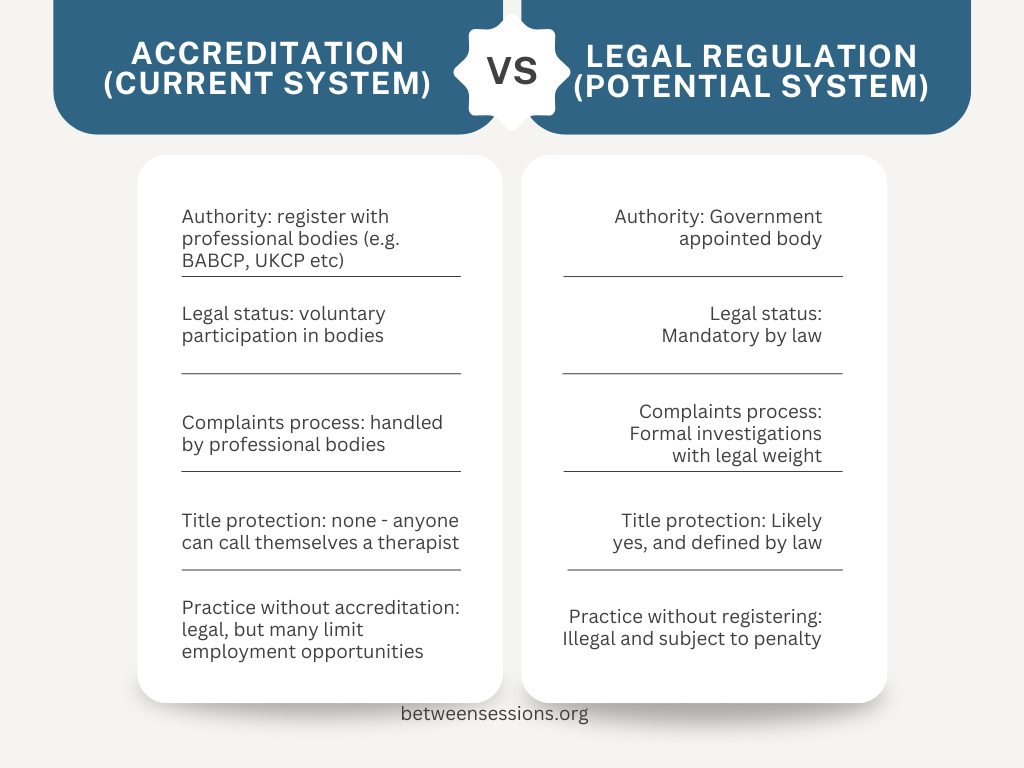Is Therapy in the UK About to Be Regulated? What This Means for Your Practice
Minister Kinnock's recent comments signal potential major changes to how therapists practice – here's what you need to know and what this all means!
Primary care minister Stephen Kinnock has announced plans to crack down on "unregulated private sector" therapists and counsellors, signalling a potential shift toward mandatory regulation in the UK's mental health landscape.
Speaking at the recent Pulse LIVE conference in London, Kinnock expressed concern about "diagnoses being given out by the private independent sector which are not rooted in clinical expertise" and has commissioned officials to examine the issue—raising questions about what this means for thousands of practicing therapists across the UK.
Accreditation vs. Regulation: Understanding the Difference
The distinction between accreditation and regulation is crucial for understanding what these changes might mean for therapists in private practice.
Currently, most UK therapists operate under a system of voluntary accreditation through professional bodies like the BABCP, BACP, UKCP, or BPS. While accreditation provides professional standards and ethical frameworks, it lacks the legal enforcement mechanisms of statutory regulation.
Fundamentally, anyone can practice as a counsellor or psychotherapist in the UK, whether they register with an accrediting body or not.
Regulation, on the other hand, establishes legally enforceable standards with consequences for non-compliance.
What Could Regulation Mean for Your Practice?
If the UK moves toward a regulatory model similar to other countries (e.g. USA, Canada), private UK based practitioners could expect:
Mandatory qualification requirements: Potentially including specific degree requirements and supervised practice hours
Standardised exams and qualifications: Testing competency before allowing practice
Continuing education mandates: Legally required ongoing professional development
Legal oversight: A regulatory body with investigative and disciplinary powers
For established practitioners with recognised qualifications and accreditation, the transition may be relatively straightforward. However, those with non-traditional training paths or without formal accreditation could face challenges.
The Potential Benefits of Regulation
Despite concerns, many in the field see potential advantages to a well-designed regulatory framework, particularly in light of high profile cases that have damaged the field:
Enhanced public trust in therapy services
Clear standards for entry into the profession
Protection against untrained practitioners offering potentially harmful services
Parity with other healthcare professions that are already regulated (e.g. clinical psychologists, occupational therapists etc.)
Reduction of unqualified practitioners undercutting the market with lower-quality services
More protection of vulnerable clients
What About Therapists Abroad Working Remotely with UK Clients?
A significant question emerging from this potential regulatory shift concerns therapists based outside the UK who work with British clients—a practice that has grown substantially since the pandemic normalised remote therapy.
The jurisdictional question is critical, notes Sophia Spencer, who started the Global CBT petition. "Will regulation apply based on where the therapist sits, or where the client is located? The difference could be crucial for many international CBT practices."
There are several possible approaches:
Client-location basis: Requiring anyone treating UK clients to meet UK standards, regardless of where they practice
Therapist-location basis: Applying regulations only to those physically practicing within UK borders, meaning British clients can see therapists from abroad who do not meet UK regularly requirements
Reciprocity agreements: Recognising the credentials of therapists regulated in certain other countries
For the estimated thousands of therapists working remotely with UK clients from abroad, this regulatory uncertainty adds another layer of complexity to their practice planning.
The Complications of Regulating a Diverse Field
Any move toward regulation faces significant challenges in the UK's uniquely diverse therapeutic landscape. Unlike countries where regulation was established early in the profession's development, the UK therapy field has evolved for decades without regulation.
From psychodynamic counselling to CBT to integrative approaches, EMDR to traditional analysis—creating a legal framework that accommodates this diversity without privileging certain modalities would be complex.
This diversity extends to training institutions as well. The UK currently has hundreds of therapy training programs ranging from university-based master's degrees, CBT PGDips, to independent training institutes, professional apprenticeships, and diploma programs—each with different standards, lengths, and emphasis.
The question becomes whether regulation would take into account existing practitioners with diverse training backgrounds or establish a cut-off date after which new standardised requirements would apply.
Due to CBT therapists' integration within the NHS and the existence of standardised training pathways like the IAPT program, it can be hypothesised that CBT therapists would likely find this transition (hopefully!) smoother than practitioners of some other modalities. The established frameworks for CBT training, supervision, and practice already align closely with what regulation might require.
Preparing Your Practice for Potential Changes
While specific regulatory proposals haven't been announced, forward-thinking practitioners can begin preparing:
Document your qualifications and practice history thoroughly
Stay engaged with your professional body for updates and advocacy opportunities
Review your practice policies for areas that might need strengthening under a regulatory framework
For international practitioners, keep updated on the developments in the UK
The Road Ahead
The timeline for any regulatory changes remains unclear, though Kinnock's comments suggest the government is in the early information-gathering stage.
"I have commissioned my officials to look at that," he stated at the Pulse conference1, indicating that formal proposals may still be months or years away.
What seems certain is that the status quo is under scrutiny, with implications for clients and therapists.
Between Sessions is committed to keeping our valued paid readers updated as this situation develops. We'll be monitoring government announcements, consulting with regulatory experts, and providing practical guidance to help you navigate any changes that emerge.
Look for regular updates in our newsletter and upcoming articles!
What do you think? Do you agree with Kinnock’s comments?
https://www.pulsetoday.co.uk/news/clinical-areas/mental-health-pain-and-addiction/minister-announces-crackdown-on-private-sector-therapists-at-pulse-conference/?sfnsn=scwspmo&fbclid=IwY2xjawJObBtleHRuA2FlbQIxMAABHaITzGSSfw30LseHkrktpNgqoZ8UJEHIIU5anU1xRbI4D22-NQzxRwM5nw_aem_W651U5AHnUHvmD8HZeXCOw




